
Jeju Island, often referred to as the “Island of the Gods,” is a captivating destination located off the southern coast of South Korea. This volcanic island is renowned for its dramatic landscapes, lush greenery, pristine beaches, and vibrant culture. Whether you’re a nature enthusiast, a history buff, or simply seeking relaxation in paradise, Jeju offers a diverse range of activities and attractions to suit every traveller’s tastes. Here’s a guide to some of the best things to do on Jeju Island.
1. Hike Mount Hallasan 한라산
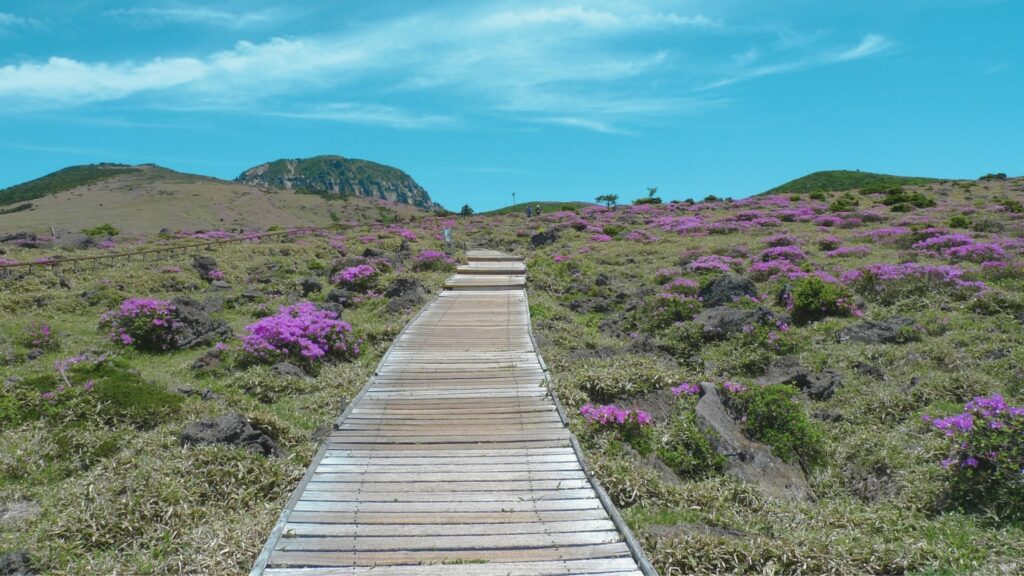
When you, the intrepid explorer, set your sights on conquering Jeju Island’s natural masterpiece, Mount Hallasan, prepare for an unforgettable adventure. Standing tall at 1,950 meters above sea level, this dormant volcano is not only a symbol of Jeju’s geological and cultural significance but also a hiker’s dream come true.
Opt for the Seongpanak Trail, the island’s most beloved hiking route, and immerse yourself in a journey that leads through lush forests, serene lakes, and ultimately to the summit. The Seongpanak Trail typically takes around 8-9 hours to complete, making it a full-day endeavour for those seeking both physical challenges and breathtaking panoramic views.
Alternatively, hike the shortest trail available for Mount Hallasan, the “Eorimok Course.” This trail is a popular choice for visitors who want to experience the beauty of Mount Hallasan without committing to a long and strenuous hike. Here are the key features of the Eorimok Course:
The Eorimok Course is approximately 3.7 kilometres (2.3 miles) one-way, making it one of the shortest hiking options on Mount Hallasan. Hiking this trail typically takes around 1.5 to 2 hours to reach the Eorimok Shelter, depending on your pace and stops along the way. The Eorimok Course is considered a relatively easy trail with a gradual ascent. It is suitable for hikers of all skill levels, including families and beginners.
Along the way, you’ll encounter an array of diverse flora and fauna in the Hallasan National Park, gaining insight into the island’s vibrant ecosystems. This hiking experience is not just about conquering a peak; it’s a profound connection with nature, history, and the sheer beauty of Jeju Island.
2. Explore Seongsan Ilchulbong (Sunrise Peak) 성산 일출봉
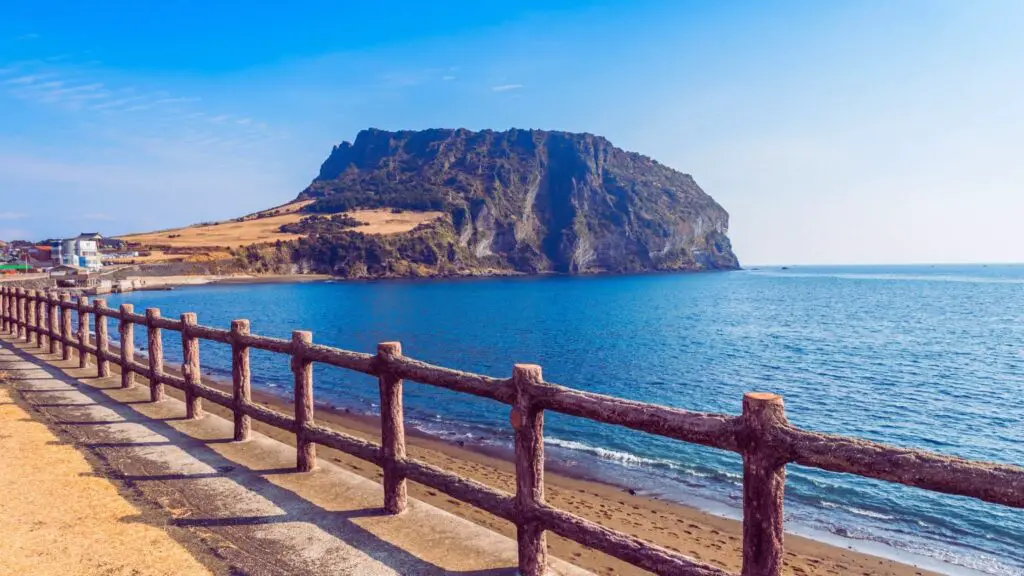
Imagine yourself standing at the foot of a colossal volcanic crater, ready to embark on a once-in-a-lifetime adventure. Seongsan Ilchulbong, often referred to as Sunrise Peak, is a natural wonder that awaits your exploration. As you ascend along the well-marked trail, you’ll be captivated by the lush flora and awe-inspiring rock formations, but the true reward comes at dawn when you reach the summit. There, you’ll witness a breathtaking sunrise over the crater, casting a mesmerizing glow upon the surrounding sea and landscape. This UNESCO World Heritage site offers a surreal and unforgettable experience that will leave you in absolute wonder and awe.
Address:
284-12, Ilchul-ro, Seogwipo-si, Jeju-do
1330 Travel Hotline:
+82-2-1330 (Korean, English, Japanese, Chinese) • For more info: +82-64-710-7923
Operating hours:
March-October 07:30-19:00 / November-December 07:00-17:50
3. Visit Manjanggul Cave 만장굴
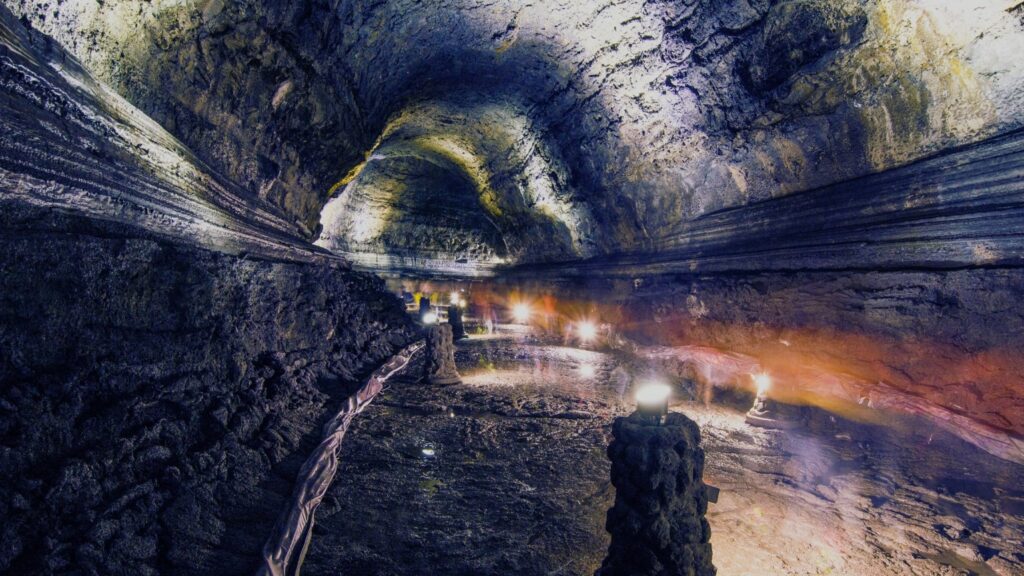
Picture yourself stepping into a world where time stands still, where nature’s artistry unfolds before your eyes. Manjanggul Cave, one of the world’s longest lava tubes, invites you to explore its enigmatic depths. As you venture through the cave’s eerie tunnels, you’ll be surrounded by the mesmerizing beauty of lava stalactites and columns, forged by ancient volcanic eruptions. The sheer scale of this geological wonder is awe-inspiring, offering a glimpse into the earth’s fiery history. Manjanggul Cave promises an otherworldly journey, where you’ll traverse underground passages and marvel at the remarkable formations sculpted by the forces of nature over millennia.
Address:
182, Manjanggul-gil, Jeju-si, Jeju-do
Inquiries:
1330 Travel Hotline: +82-2-1330 (Korean, English, Japanese, Chinese). For more info: +82-64-710-3945,+82-64-710-7903
Operating hours:
09:00-18:00. Last admission 17:10. Tours 09:00-17:00 (free; onsite registration)
4. Jeju Folk Village Museum 제주민속촌
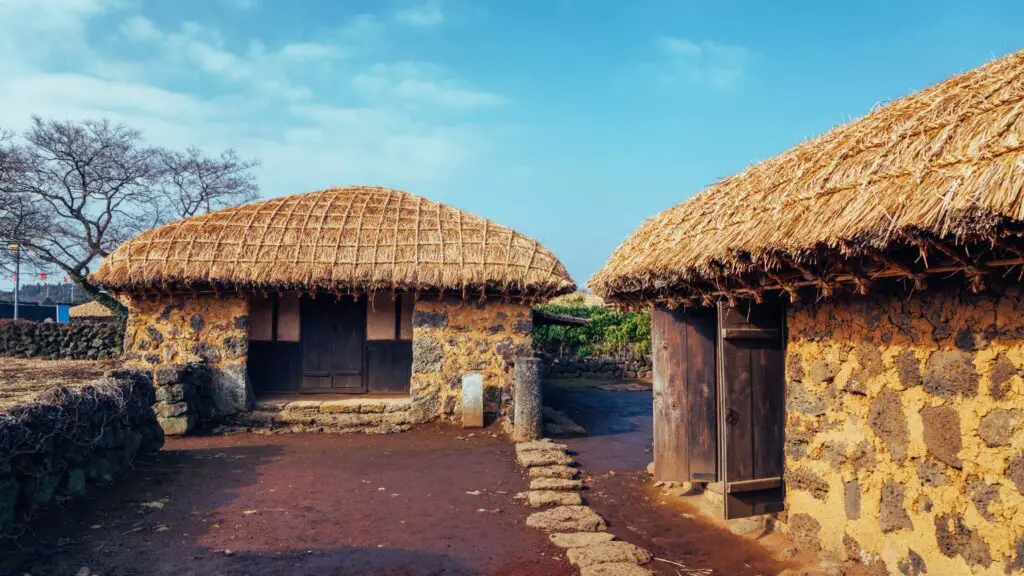
Step into a living canvas of history at the Jeju Folk Village Museum, where you’re transported back in time to the rich cultural tapestry of Jeju Island. As you wander through the meticulously preserved traditional thatched-roof houses, artefacts, and vibrant live performances, you’ll find yourself immersed in the island’s heritage. The museum offers a captivating window into the daily life, customs, and rituals of the island’s past, bringing centuries-old traditions to life. For you, the curious traveller, this immersive experience is a journey back in time that unveils the enduring spirit of Jeju’s people and their unique way of life.
Address:
631-34 Minsokhaean-ro, Pyoseon-myeon, Seogwipo-si, Jeju-do, South Korea
Inquiries:
+82-64-787-4501
Operating hours:
[October-February] 08:30–17:00 [March] 08:30-17:30 [April–July 15] 08:30–18:00 [July 16 – August] 08:30–18:30 [September] 08:30–18:00
5. Marvel at Jusangjeolli Cliffs 주상절리대
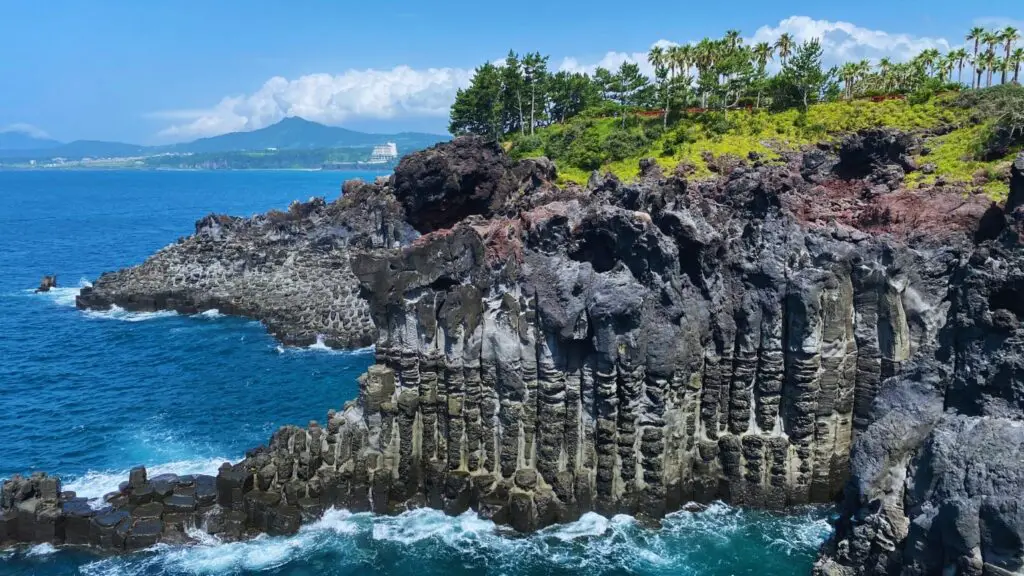
Prepare to be spellbound by the breathtaking natural spectacle of Jusangjeolli Cliffs, a geological masterpiece on South Korea’s Jeju Island. As you stand before these hexagonal basalt pillars, your senses will be overwhelmed by the sheer grandeur of nature’s artistry. Carved by ancient volcanic activity, the cliffs form a striking seascape where the sea crashes against the pillars, creating a symphony of sights and sounds. Your visit to Jusangjeolli Cliffs promises not only a visual feast but also a deep appreciation for the forces that have shaped this awe-inspiring landscape over millennia, making it a must-see destination for every nature enthusiast and adventurer.
Address:
36-30, Ieodo-ro, Seogwipo-si, Jeju-do
Inquiries:
1330 Travel Hotline: +82-2-1330 (Korean, English, Japanese, Chinese). For more info: +82-64-738-1521
Operating hours:
09:00 -18:00
6. Sip Tea at O’Sulloc Tea Museum 오설록 티 뮤지엄
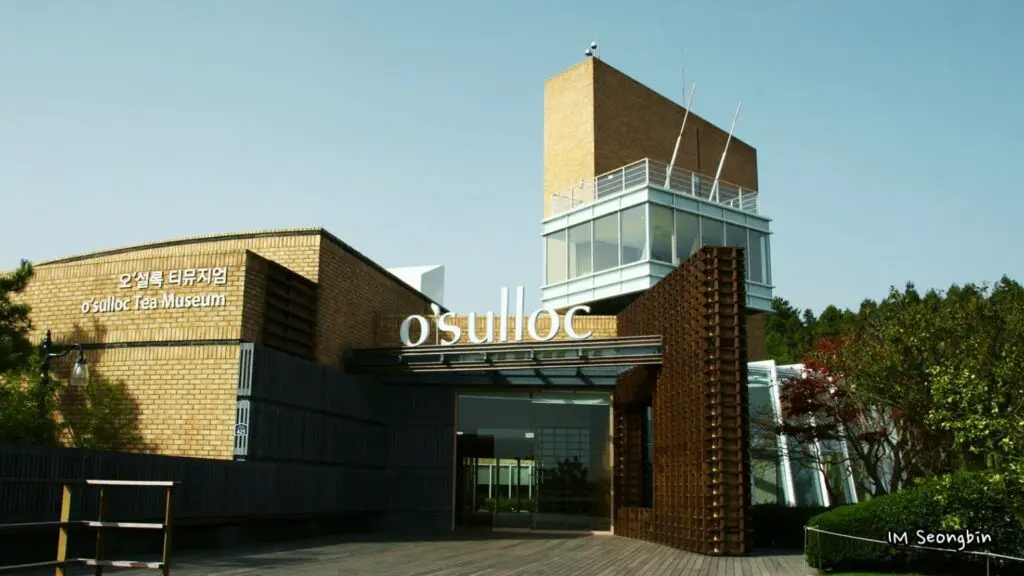
As you step into the O’Sulloc Tea Museum in Jeju, you enter a world where the ancient art of tea-making meets contemporary cultural appreciation. Surrounded by lush tea fields, the museum offers a deep dive into the history and culture of tea on the island. Explore the various exhibits that detail the cultivation and production of Jeju’s renowned green tea, and witness the traditional tea-making process in action. As you move through the museum, you’ll have the opportunity to sample an array of green tea varieties and delight in tea-infused desserts at the museum’s café. The serene ambiance and picturesque tea fields that envelop the O’Sulloc Tea Museum make it a destination not only for tea connoisseurs but also for those seeking a tranquil retreat into the heart of Jeju’s tea culture.
Address:
15 Sinhwayeoksa-ro, Andeok-myeon, Seogwipo-si, Jeju-do, South Korea
Inquiries:
1330 Travel Hotline: +82-2-1330 (Korean, English, Japanese, Chinese). For more info: +82-64-794-5312~3
Operating hours:
09:00-18:00
Website:
7. Visit Jeju Loveland
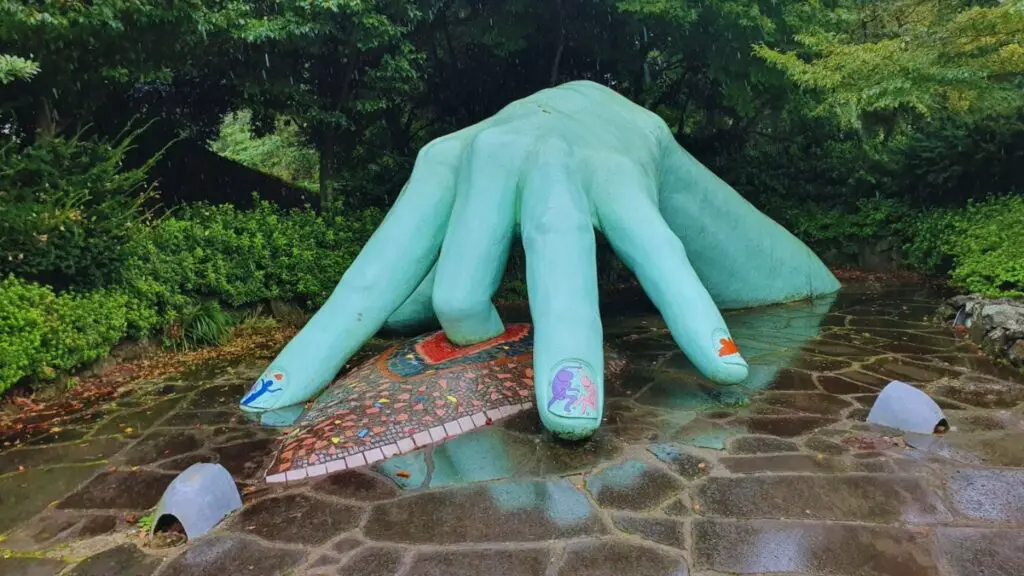
Step into the intriguing and artistic realm of Jeju Loveland, a unique and provocative destination that defies convention and celebrates human sensuality. As you wander through this open-air sculpture park, you’ll encounter a vibrant and whimsical world of erotic art and sculptures created by artists from across South Korea. The sculptures, ranging from playful to sensual, explore themes of love, desire, and human relationships in an uninhibited and candid manner. The park’s intention is to liberate visitors from societal taboos and encourage open discussions about sexuality and human connections. Jeju Loveland is not only a fascinating exploration of art and desire but also a thought-provoking experience that challenges traditional norms and fosters understanding and acceptance.
Address:
2894-72, 1100-ro, Jeju-si, Jeju-do
Inquiries:
1330 Travel Hotline: +82-2-1330 (Korean, English, Japanese, Chinese). For more info: +82-64-712-6988
Operating hours:
09:00-22:00 (Last ticketing: 21:30)
Website:
www.jejuloveland.com
8. Discover Jeju Teddy Bear Museum

As you step into the enchanting world of the Jeju Teddy Bear Museum, you’ll find yourself immersed in a whimsical and heartwarming journey through the history of teddy bears. This captivating museum, set against the picturesque backdrop of Jeju Island, houses an extensive collection of teddy bears from various eras and cultures. Each bear tells a unique story, from their origins as a beloved childhood toy to their evolution as cultural icons. You’ll have the opportunity to explore themed exhibitions that showcase the bears in various roles and settings, from historical events to pop culture moments. The Jeju Teddy Bear Museum is not just a tribute to these cuddly companions but also a delightful experience that sparks nostalgia, creativity, and a sense of wonder, making it a must-visit destination for teddy bear enthusiasts of all ages.
Address:
31, Jungmungwangwang-ro110beon-gil, Seogwipo-si, Jeju-do
Inquiries:
1330 Travel Hotline: +82-2-1330 (Korean, English, Japanese, Chinese). For more info: +82-64-738-7600
Operating hours:
09:00-18:00 (Last admission 17:30)
Website:
www.teddybearmuseum.com
9. Jeju Aquarium Aqua Planet
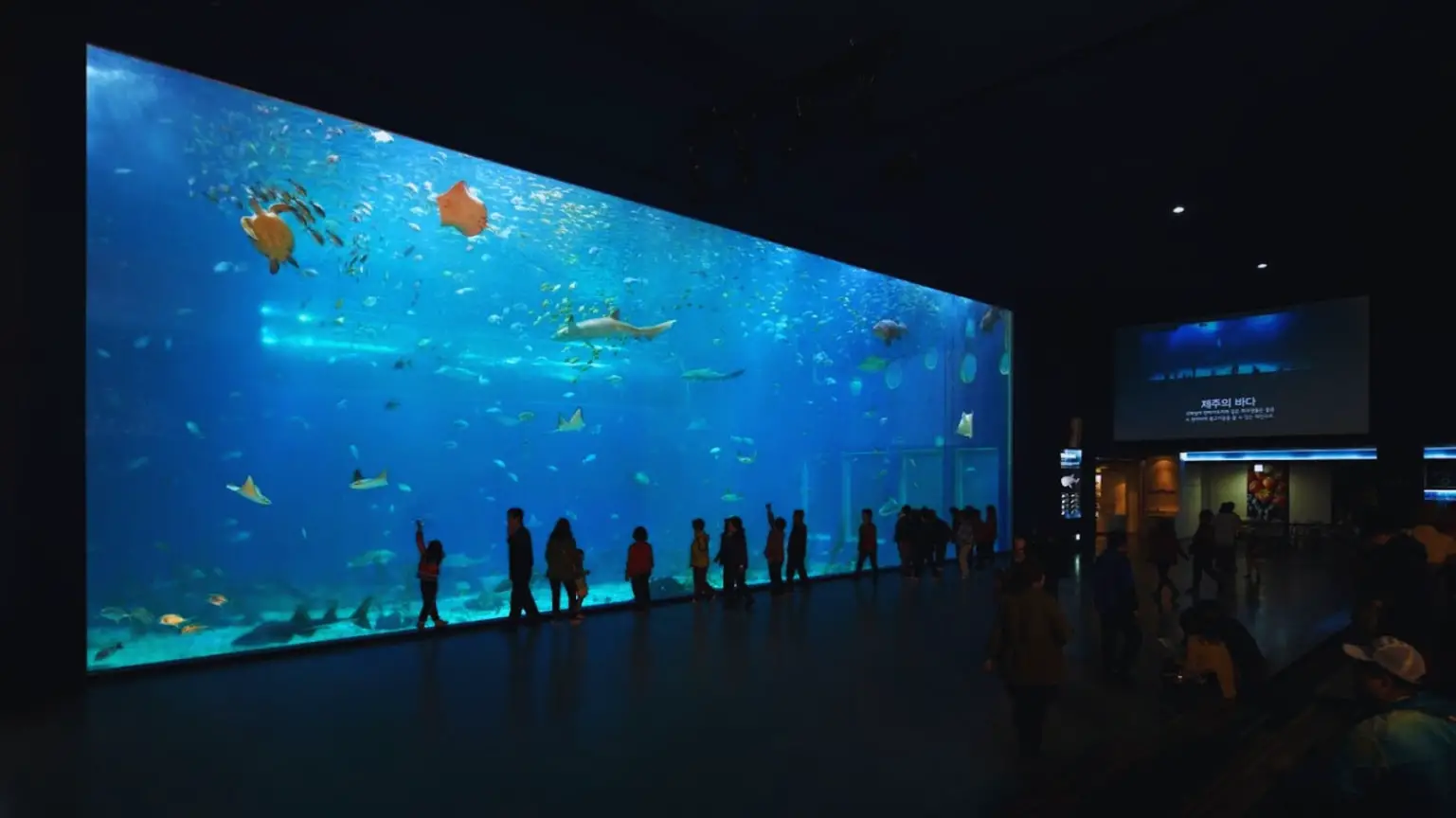
Prepare to be enchanted as you step into the wondrous realm of Aqua Planet Jeju, an aquatic wonderland nestled on the stunning shores of Jeju Island. This captivating aquarium promises a mesmerizing journey through the mysteries of the deep, where you’ll encounter a diverse and awe-inspiring array of marine life from all corners of the globe. Immerse yourself in the aquatic wonders of vibrant coral reefs, gracefully gliding rays, and the majestic presence of sharks. Aqua Planet Jeju is not merely an entertainment destination; it’s an educational and conservation hub, dedicated to fostering a deeper understanding of our oceans and the need to protect their delicate ecosystems. With interactive exhibits, informative presentations, and the chance to witness thrilling aquatic performances, this is an experience that will leave you both entertained and inspired, making it an essential stop for families, nature enthusiasts, and anyone eager to explore the wonders of the underwater world.
Address:
95, Seopjikoji-ro, Seogwipo-si, Jeju-do
Inquiries:
1330 Travel Hotline: +82-2-1330 (Korean, English, Japanese, Chinese). For more info: +82-1833-7001
Operating hours:
09:30–19:00. Last ticketing 18:00 / Last admission 18:30
Website:
www.aquaplanet.co.kr/jeju
10. Wander Jeju’s Waterfalls
Jeju Island is renowned for its natural beauty, and its waterfalls are among the most captivating attractions. Here are three of the island’s most famous waterfalls:
Cheonjiyeon Falls (천지연 폭포)
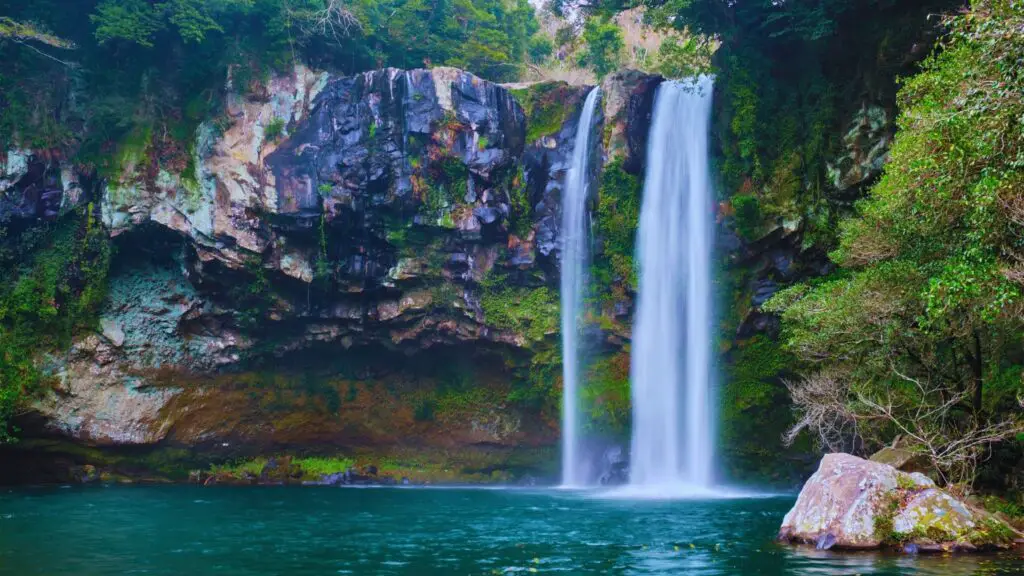
Located in Seogwipo City on the southern coast, Cheonjiyeon Falls is one of Jeju’s most iconic waterfalls. Translating to “Pond of the Emperor of Heaven,” this waterfall cascades gracefully into a freshwater pool surrounded by lush vegetation. The sight is particularly enchanting in the evening when the waterfall is illuminated, creating a romantic atmosphere. Visitors can explore the well-maintained trails that lead to the waterfall, passing through beautiful gardens and providing excellent photo opportunities along the way.
Jeongbang Falls (정방폭포)
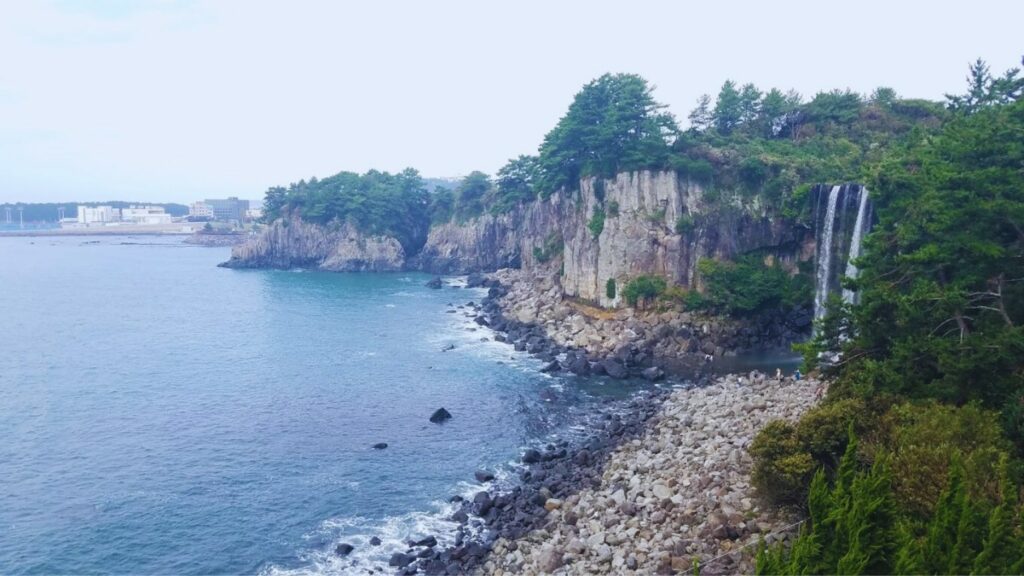
Also situated in Seogwipo City, Jeongbang Falls is notable for being one of the few waterfalls in Asia that directly flows into the sea. With a height of about 23 meters, Jeongbang Falls offers a picturesque sight as it plunges into the rocky shoreline. Visitors can get quite close to the waterfall and even walk behind it, experiencing the refreshing mist. The area around Jeongbang Falls is adorned with rugged cliffs and panoramic views of the coastal landscape, making it an excellent spot for nature enthusiasts.
Cheonjeyeon Falls (천제연 폭포)
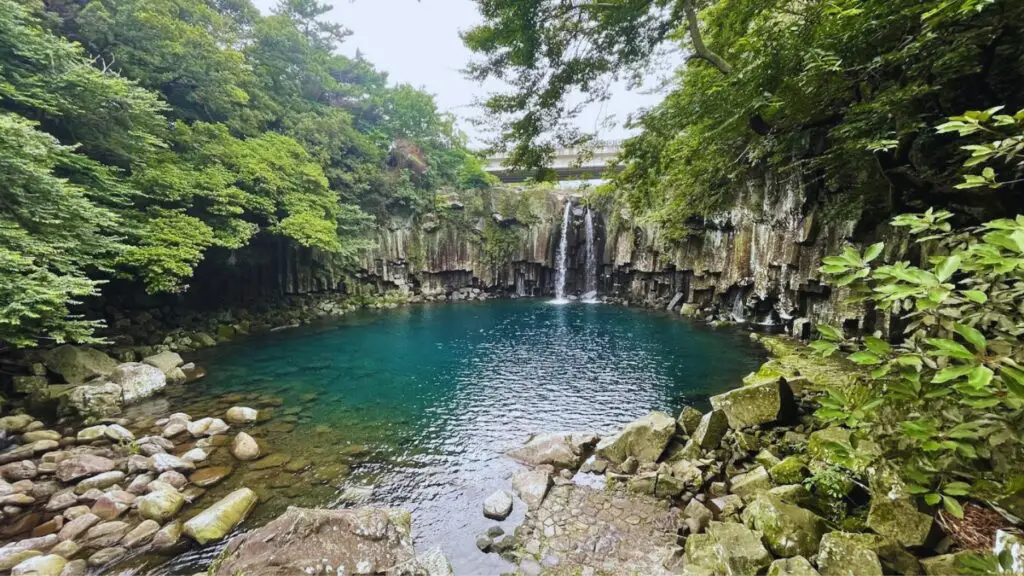
Close to Cheonjiyeon Falls in Seogwipo City, Cheonjeyeon Falls is part of the same natural complex. Comprising three tiers of waterfalls, Cheonjeyeon Falls is named “The Pond of God” and is surrounded by lush subtropical gardens. The first waterfall is the most accessible and striking, while the second and third tiers offer quieter and more secluded spots for reflection. Adjacent to the falls, the Seonimgyo Bridge leads to a picturesque botanical garden where you can enjoy a leisurely stroll among a wide variety of plants and flowers.
These three famous waterfalls on Jeju Island offer not only stunning natural beauty but also a glimpse into the island’s rich cultural and natural heritage. Each waterfall has its unique charm and should be on the itinerary of anyone exploring the enchanting landscapes of Jeju.
11. Explore Cultural Sites
Jeju Island, known for its stunning natural beauty, also boasts a rich cultural heritage with several famous cultural sites that offer insights into the island’s history and traditions. Here are three of the most renowned cultural sites on Jeju Island:
Seongeup Folk Village (성읍민속마을)
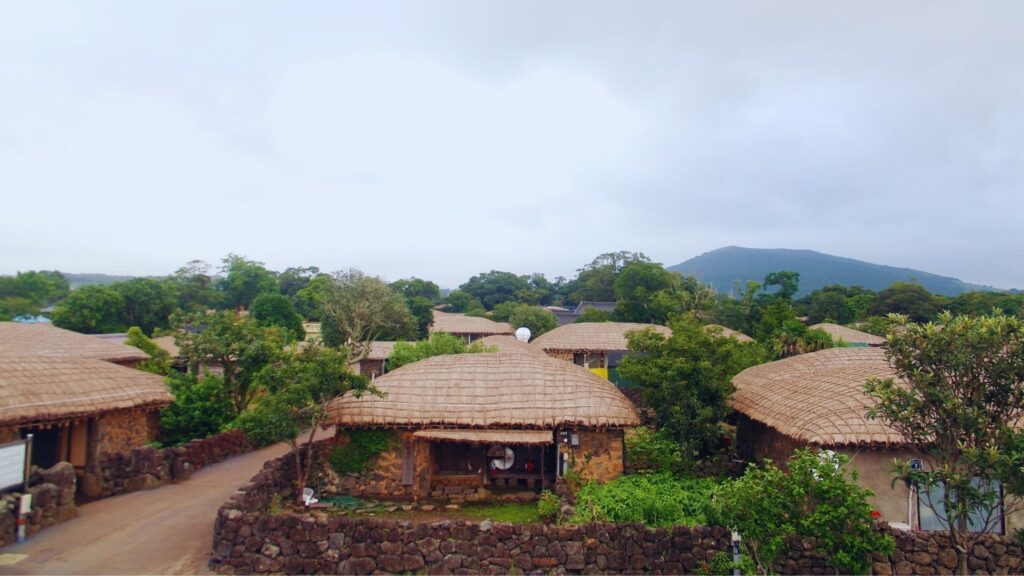
Seongeup Folk Village is located on the eastern side of Jeju Island, near Seogwipo City. This well-preserved traditional village is a living testament to Jeju’s cultural heritage. Visitors can explore traditional thatched-roof houses, called “hanok,” that date back centuries. The village offers a glimpse into the daily life, customs, and traditions of the island’s past. You’ll find cultural demonstrations, including traditional dance performances and craft workshops. Seongeup Folk Village provides panoramic views of Hallasan, the island’s iconic volcano, and the surrounding countryside.
Address:
30번지 Seongeupjeonguihyeon-ro, Pyoseon-myeon, Seogwipo-si, Jeju-do, South Korea
Jejumok Gwana Government Office (제주목관아)
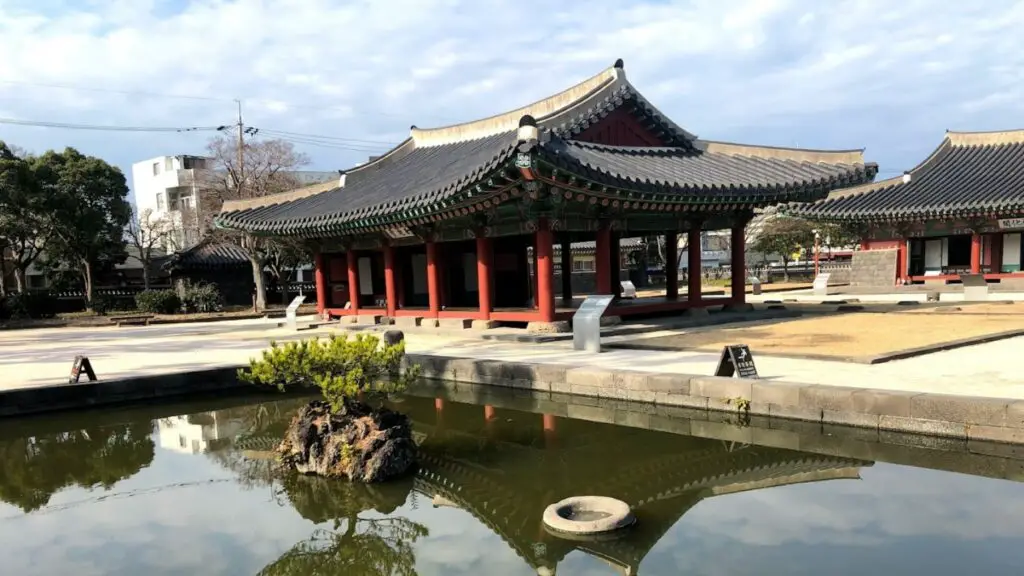
Situated in Jeju City, Jeju Mokgwana is the former provincial government office and a historical site of great significance. This site was the center of administrative power during the Joseon Dynasty (1392-1910) when Jeju was known as Jeju Bu, a provincial capital. Today, it stands as a cultural heritage site showcasing traditional Korean architecture and historical artifacts. Visitors can explore the well-preserved government office complex and gain insights into the island’s governance and history during the Joseon era. Jeju Mokgwana provides a unique opportunity to understand the island’s role in the broader context of Korean history.
Address:
13 Gwandeok-ro 7-gil, Jeju-si, Jeju-do, South Korea
Jeju Stone Park (제주 돌문화공원)
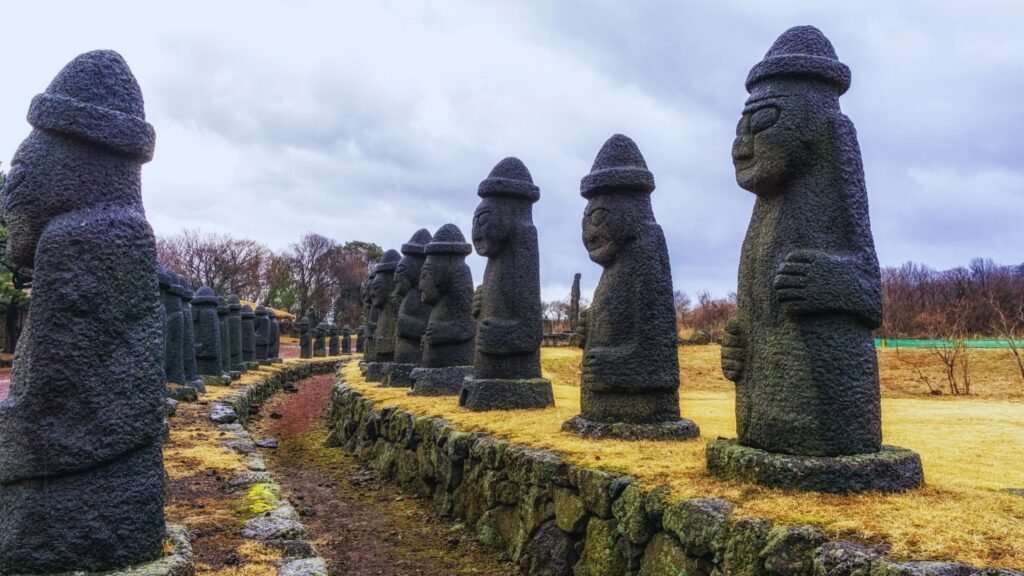
Located in Jeju City, Jeju Stone Park is dedicated to the island’s unique stone culture. This cultural site showcases the significance of stones in Jeju’s history, culture, and daily life. Visitors can explore stone sculptures, gardens, and learn about the island’s traditional stone houses, known as “dolharubang,” which are iconic symbols of Jeju. The park also features various stone-related exhibitions and educational programs. The park’s landscaped gardens and artistic use of stones create a serene and contemplative atmosphere, making it a pleasant place for both cultural exploration and relaxation.
Address:
2023 Namjo-ro, Jocheon-eup, Jeju-si, Jeju-do, South Korea
These three famous cultural sites in Jeju Island offer a glimpse into the island’s rich history, traditions, and cultural heritage. Exploring these sites allows visitors to connect with the unique aspects of Jeju’s identity beyond its natural beauty.
12. Enjoy Nature and Outdoor Activities
Certainly, Jeju Island offers a wide array of outdoor and nature experiences that allow visitors to connect with its natural beauty. Here are three famous outdoor activities to enjoy in Jeju:
Horseback Riding
Jeju Island’s pristine landscapes are best appreciated on horseback. Horseback riding is a popular activity on the island, allowing visitors to explore the lush countryside, coastal areas, and even volcanic terrain atop these gentle creatures. You can opt for horseback rides along scenic beaches, through lush forests, and even up the slopes of Mount Hallasan. Riding along Jeju’s pristine coastline with the sound of waves crashing is an unforgettable experience.
Jeju Olle Trails
The Jeju Olle Trails are a network of picturesque walking trails that crisscross the island, offering hikers a chance to immerse themselves in Jeju’s natural beauty and culture. There are over 20 routes, each showcasing different aspects of the island’s landscapes and communities. Hiking along the Olle Trails allows you to explore coastal cliffs, serene villages, lush forests, and volcanic terrain. The trails are well-marked, and you can choose routes based on your preferred level of difficulty and the type of scenery you want to experience.
Website with trail details:
https://www.jejuolle.org/trail_en#/
Diving and Snorkeling
Jeju Island is surrounded by crystal-clear waters teeming with marine life. Diving and snorkeling are popular activities for those looking to explore the island’s vibrant underwater world. Dive sites like Munseom Island and Biyangdo Island offer excellent opportunities to encounter colorful coral reefs, diverse fish species, and even shipwrecks. Snorkelers can enjoy the shallow, clear waters near beaches like Hamdeok Beach and Jungmun Saekdal Beach.
Diving with Jeju Female Haenyeo Female Divers
Diving with the Jeju Haenyeo, also known as “sea women,” offers a unique and culturally enriching experience on Jeju Island. These skilled female divers have been the custodians of Jeju’s coastal traditions for centuries, and joining them on a diving expedition is a journey into their world and the island’s underwater treasures. As you dive alongside these remarkable women, you’ll witness their incredible breath-holding and free-diving skills, allowing them to harvest seafood like abalone, sea cucumbers, and seaweed from the depths of the sea.
Beyond the adventure of underwater exploration, this experience provides an opportunity to learn about the rich heritage and resilience of the Haenyeo, who have sustained their way of life through generations. It’s a chance not only to admire the island’s marine ecosystems but also to connect with the cultural heart of Jeju.
13. Sample Local Cuisine
Jeju Island boasts a delectable array of local dishes that showcase the island’s unique culinary traditions and fresh ingredients. Here are three must-try local foods in Jeju:
Jeju Black Pork BBQ (흑돼지 바베큐)
Jeju black pork is a renowned local delicacy, known for its exceptional flavour and tenderness. Raised on the island’s clean and natural pastures, the pork is often cooked over open charcoal grills, allowing the meat’s rich, smoky aroma to infuse into every bite.
Be sure to savor the succulent cuts of black pork as samgyeopsal (pork belly) or galmaegisal (pork skirt meat). Accompanied by various dipping sauces, fresh vegetables, and local side dishes, this barbecue experience is a delightful and unforgettable culinary adventure.
Jeju Abalone (전복)
Abalone is a prized delicacy on Jeju Island, and you’ll find it featured in a variety of dishes, from soups to porridge to grilled preparations. The island’s clean, nutrient-rich waters produce abalone known for its sweet and tender meat.
Try dishes like “jeonbok juk” (abalone porridge) for a comforting, flavorful experience. Alternatively, indulge in grilled abalone, which is often prepared with a simple seasoning to let the natural flavour of the shellfish shine through.
Haemul Jeongol (해물전골)
Haemul Jeongol is a hearty and spicy seafood stew that reflects the island’s strong connection to the sea. It typically features a combination of fresh local seafood, such as shrimp, clams, octopus, and various fish, along with tofu and vegetables. The ingredients are simmered in a flavorful broth, often seasoned with Jeju’s native citrus fruit, “hallabong.”
Enjoy the comforting and aromatic flavours of this hot pot dish, especially during cooler months. The blend of fresh seafood and the spicy broth creates a harmonious and satisfying culinary experience.
14. Relax on Beautiful Beaches
Jeju Island is renowned for its pristine beaches, each offering a unique coastal experience. Here are three of the most famous beaches on the island:
Hyeopjae Beach (협재해변)
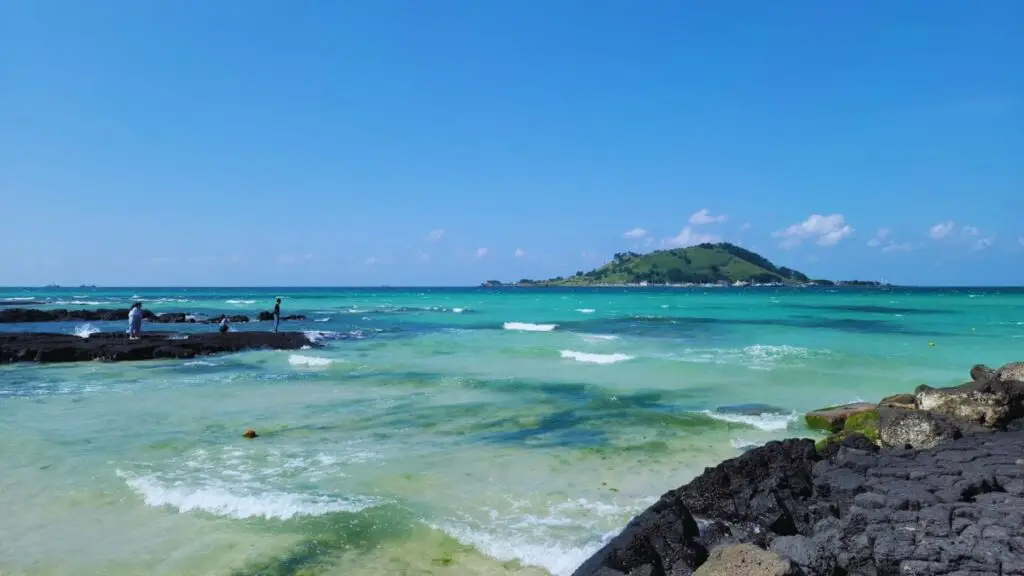
Hyeopjae Beach, located on the western coast of Jeju, is celebrated for its crystal-clear waters and powdery white sands. This beach is part of Hanrim Park and is surrounded by lush groves of black pine trees. The scenic beauty of the area, with Hallasan Mountain as a backdrop, makes it a popular destination for both locals and tourists.
Visitors can take leisurely walks along the shoreline, enjoy picnics in the pine groves, and participate in various water sports like kayaking and windsurfing. The beach is also famous for its stunning sunsets.
Address:
329-10 Hallim-ro, Hallim-eup, Jeju-si, Jeju-do, South Korea
Jungmun Saekdal Beach (중문색달해변)
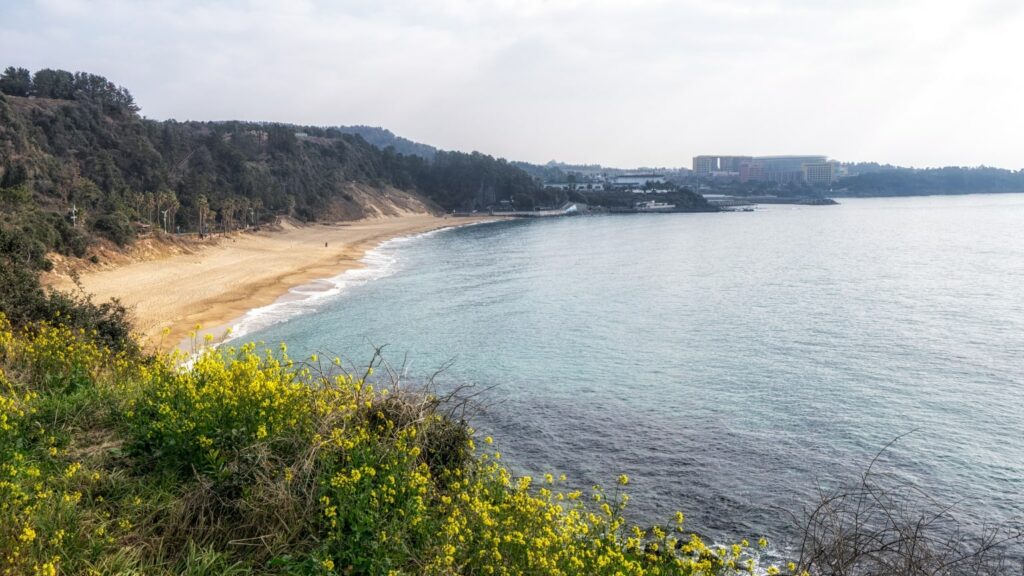
Located in the Jungmun Tourist Complex on the southern coast, Jungmun Saekdal Beach is famous for its dramatic rocky formations and unique black sand. The juxtaposition of the dark volcanic sands against the clear blue waters creates a striking and picturesque landscape.
Visitors can relax on the beach, take in the stunning views of the surrounding cliffs, and explore nearby attractions like the Jusangjeolli Cliffs. The beach is also a popular spot for surfing, thanks to its waves and consistent wind patterns.
Address:
Jungmungwangwang-ro 72beon-gil, Seogwipo-si, Jeju-do
Hamdeok Beach (함덕해수욕장)
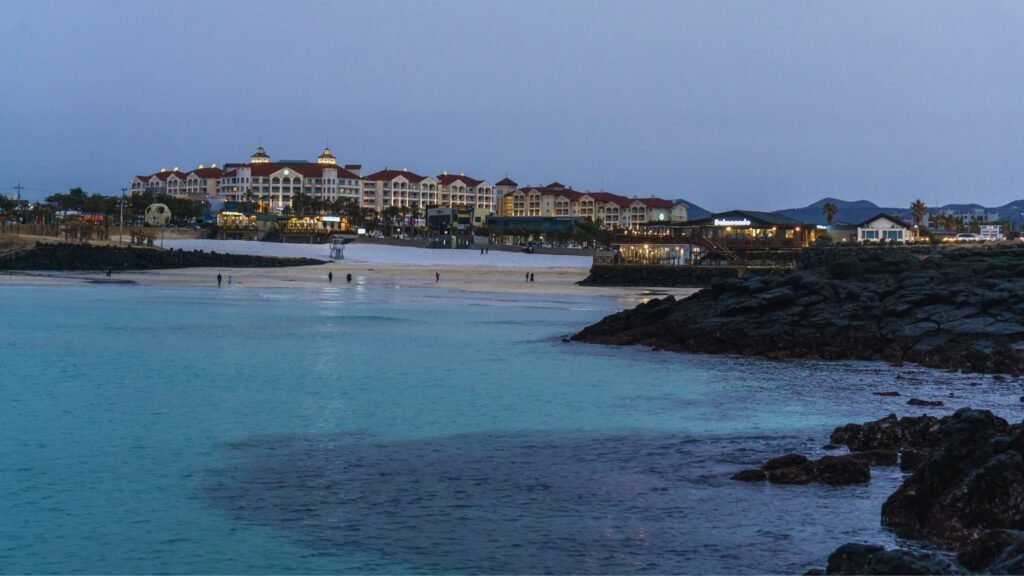
Hamdeok Beach, situated on the eastern coast of Jeju, is known for its shallow, emerald-green waters and soft sandy shores. It’s an ideal destination for families and those seeking a tranquil beach experience.
The calm waters of Hamdeok Beach are perfect for swimming and snorkelling, and the area is surrounded by cafes, restaurants, and convenience stores. The nearby “Geumneung Beach” and “Hagosudong Beach” are also worth exploring for their natural beauty.
Address:
519-10, Johamhaean-ro, Jeju-si, Jeju-do
Conclusion
Island life on Jeju Island is a unique and enchanting experience that offers a stark contrast to the hustle and bustle of mainland cities in South Korea. Life in Jeju is decidedly slower and more laid-back than what you might find on the Korean mainland. The island’s natural beauty and serene surroundings encourage a more relaxed pace of life. Residents and visitors alike embrace the “slow life” philosophy, taking time to appreciate the island’s landscapes, culture, and traditions.
Jeju Island’s residents have a profound connection to the island’s natural surroundings. The volcanic terrain, lush forests, and pristine coastline are not just scenic backdrops but integral to daily life. Many islanders are involved in agriculture, fishing, or tourism, often relying on the land and sea for their livelihoods.
Overall, life on Jeju Island is characterized by its natural beauty, strong sense of community, and the preservation of unique cultural traditions. It’s a place where residents and visitors alike can immerse themselves in a way of life that is deeply connected to the island’s stunning natural surroundings and rich heritage.



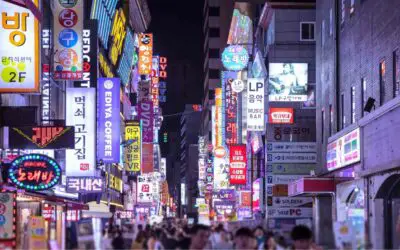
0 Comments